
Karwar is a seaside city, taluka, and administrative headquarters of Uttara Kannada district lying at the mouth of the Kali river on the Kanara coast of Karnataka state, India.
This article is about the culture of natives of the Indian state of Goa.

Luís Remo de Maria Bernardo Fernandes is a singer and musician from India with naturalized Portuguese citizenship. Known as a pioneer of Indian pop music, he performs pop/rock/Indian fusion and is also a film playback singer. His musical work is a fusion of many different cultures and styles that he has been exposed to as a child in Goa and in his later travels around the world. Such influences include Goan and Portuguese music, Sega music, African music, Latin music, the music of erstwhile European communist states, those of the dance halls from Jamaica and Soca.

The state of Goa, in India, is famous for its beaches and places of worship. Tourism is its primary industry, and is generally focused on the coastal areas of Goa, with decreased tourist activity inland.

Lorna Cordeiro, also known as Lorna, is a Konkani singer from the coastal state of Goa, India, and is popularly known as the "Nightingale of Goa".
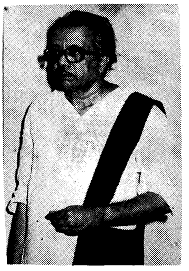
Ravindra Kelekar was a noted Indian author who wrote primarily in the Konkani language, though he also wrote in Marathi and Hindi. A Gandhian activist, freedom fighter and a pioneer in the modern Konkani movement, he is a well known Konkani scholar, linguist, and creative thinker. Kelkar was a participant in the Indian freedom movement, Goa's liberation movement, and later the campaign against the merger of the newly formed Goa with Maharashtra. He played a key role in the founding of the Konkani Bhasha Mandal, which lead the literary campaign for the recognition of Konkani as a full-fledged language, and its reinstatement as the state language of Goa. He authored nearly 100 books in the Konkani language, including Amchi Bhas Konkaneech, Shalent Konkani Kityak, Bahu-bhashik Bharatant Bhashenche Samajshastra and Himalayant, and also edited Jaag magazine for more than two decades.
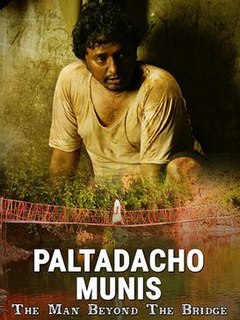
Paltadacho Munis or The Man Beyond the Bridge is an Indian film in Konkani directed by Laxmikant Shetgaonkar. Set in Goa, the film is about a recently widowed forest ranger in a dwindling forest, who strikes up an unlikely relationship with a woman he finds lost and alone in the woods. The film tries to destigmatise mental illness, often equated with being possessed by the devil in rural India.
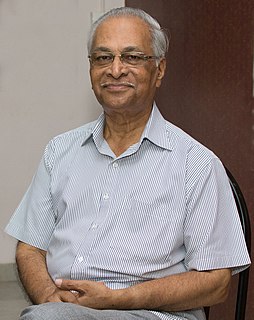
Uday Bhembre is an Indian lawyer, Konkani writer and a former member of the Goa Legislative Assembly. He is noted for his role as the editor of the Konkani daily, Sunaparant, and as a Konkani language activist. Bhembre is also widely known as the lyricist of the famed Goan Konkani language song Channeache Rati.

Paoli Dam is an Indian actress who started her career with the Bengali television serial Jibon Niye Khela (2003). She then worked in Bengali television serials such as Tithir Atithi and Sonar Harin; the former ran for six years on ETV Bangla. Dam spent her childhood in Kolkata, earning a postgraduate degree in chemistry from Rajabazar Science College. Initially, she wanted to become a chemical researcher or a pilot. Her debut Bengali film—Teen Yaari Katha, directed by Sudeshna Roy and Abhijit Guha—began in 2004, but was not released until 2012. Dam's first film release was Agnipariksha, directed by Ravi Kinagi. Between 2006 and 2009, she appeared in five Bengali films, coming into prominence with the 2009 Kaalbela, directed by Goutam Ghose.
Konkani cinema is an Indian film industry, where films are made in the Konkani language, which is spoken mainly in the Indian states of Goa, Maharashtra and Karnataka and to a smaller extent in Kerala. Konkani films have been produced in Goa, Karnataka, Maharashtra and Kerala.

Damodar Mauzo is a Goan short story writer, novelist, critic and script writer in Konkani. He was awarded the Jnanpith Award in 2021, Sahitya Akademi Award in 1983 for his novel Karmelin and the Vimala V. Pai Vishwa Konkani Sahitya Puraskar award for his novel Tsunami Simon in 2011. His collection of Short stories Teresa's Man and Other Stories from Goa was nominated for the Frank O'Connor International award in 2015. He has served as a member of the executive board, general council, as well as the finance committee of the Sahitya Akademi.
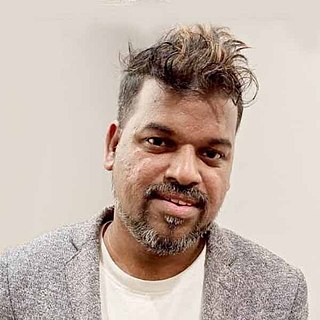
Pervis Milroy Goes, known better as Milroy Goes is an Indian film director and screenwriter of Portuguese descent from Goa His film Welcome M1LL10NS was eligible for the 91st Academy Awards in Best Picture Academy Award but was not nominated in any categories. Goes is also known for directing music videos for A R Rehman’s singer Shashaa Tirupati for major record labels in India.

Goa is a state on the southwestern coast of India within the Konkan region, geographically separated from the Deccan highlands by the Western Ghats. It is located between the Indian states of Maharashtra to the north and Karnataka to the east and south, with the Arabian Sea forming its western coast. It is India's smallest state by area and its fourth-smallest by population. Goa has the highest GDP per capita among all Indian states, two and a half times as high as the GDP per capita of the country as a whole. The Eleventh Finance Commission of India named Goa the best-placed state because of its infrastructure, and India's National Commission on Population rated it as having the best quality of life in India. It is the third-highest ranking among Indian states in the human development index.
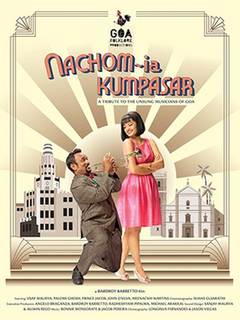
Nachom-ia Kumpasar, is a Konkani musical drama film. It is based on the lives of two jazz musicians, Chris Perry and Lorna. The film, which takes its title from the name of a song by the two artists, was directed by Bardroy Barretto. It starred Vijay Maurya and Palomi Ghosh in the lead roles. The story is told through over 20 popular Konkani songs from the 1960s and 1970s that have been re-recorded for this film. The film is set in the 1960s and is a tribute to the 'unsung' Konkani musicians of that era.
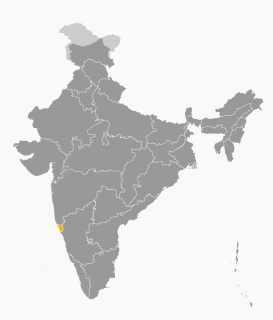
The following outline is provided as an overview of and topical guide to Goa:
Prashanti Talpankar is a writer, translator, playwright and an actor, hailing from the coastal state of Goa, India. She is also an awardee of the Sahitya Akademi Award for Translation. She currently serves as an associate professor at Dnyanprassark Mandal's college and Research Centre, Assagao.
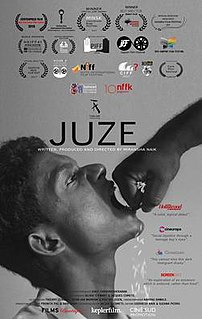
Juze or Juje is a 2017 Indian film in Konkani, written and directed by Miransha Naik. The film is about the social injustice and exploitation faced by migrant labourers in Goa, and is set in the 1990s. It was co-produced by people from India, France and Netherlands under the banner of Goa Film Bazaar, with some of the editing done in Paris.

Miransha Naik is an Indian film director, producer and screenwriter, hailing from the coastal state of Goa. He is known for his debut Konkani feature film, Juze.
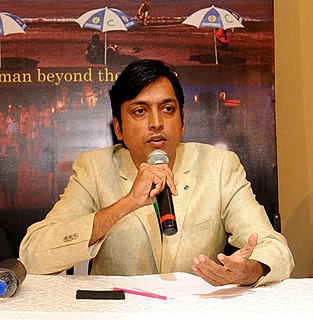
Laxmikant Shetgaonkar is an Indian film director and screenwriter from the coastal state of Goa. He is best known for his critically acclaimed Konkani films, Paltadacho Munis and Baga Beach.
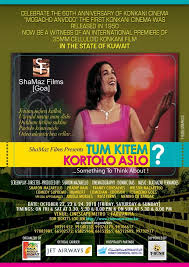
Tum Kitem Kortolo Aslo? is a 2010 Indian Konkani language film written and directed by Sharon Mazarello. The film also features Mazarello in the lead role. The story is about infidelity, from the perspective of the woman. It was produced by Mazarello and her husband, Wilmix Mazarello, under the banner of ShaMaz Films. The film premiered at the Cinescope Metro in Kuwait on 22 October 2010, marking the 60th anniversary of the release of Mogacho Anvddo, the first Konkani film. With this film, Mazarello became the first woman to direct a Konkani movie.

















